|
Books Should Be Free Loyal Books Free Public Domain Audiobooks & eBook Downloads |
|
|
Books Should Be Free Loyal Books Free Public Domain Audiobooks & eBook Downloads |
|
Top Authors |
|---|
|
Book type:
Sort by:
|
By: Okakura Kakuzo (1863-1913) | |
|---|---|
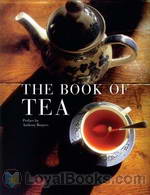 The Book of Tea
The Book of Tea
The Book of Tea was written by Okakura Kakuzo in the early 20th century. It was first published in 1906, and has since been republished many times. – In the book, Kakuzo introduces the term Teaism and how Tea has affected nearly every aspect of Japanese culture, thought, and life. The book is noted to be accessibile to Western audiences because though Kakuzo was born and raised Japanese, he was trained from a young age to speak English; and would speak it all his life, becoming proficient at communicating his thoughts in the Western Mind... | |
By: Alfred Moffat (1866-1950) | |
|---|---|
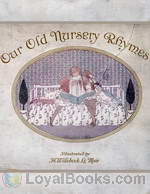 Our Old Nursery Rhymes
Our Old Nursery Rhymes
If you love and cherish old English nursery rhymes and have fond memories of your early childhood years, Our Old Nursery Rhymes by Alfred Moffat published in 1911 is indeed the little book for you! Or as a parent, if you'd like your own children to share the magic, this book provides them all. One of the most appealing aspects of this charming book is that the rhymes are all set to music and if you're musically inclined, you can certainly keep yourself and your children entertained by playing these pretty tunes... | |
By: Mary Mapes Dodge (1831-1905) | |
|---|---|
 Hans Brinker
Hans Brinker
Mary Mapes Dodge created an instant bestseller with “Hans Brinker or The Silver Skates.” She wanted the book to be partly a book of travels and partly a domestic story. It is a tale written for children that adults also find interesting and uplifting. Dodge writes as if she is sending a series of letters from Holland to children in America, and her you-are-there perspective is aided by a nice attention to detail and vivid imagery.The Brinkers are a poor but stoic family under a dark cloud – Raff, the man of the house, fell from the dikes while reinforcing them during a bad storm, and for ten years he has been in a vegetative state... | |
 Hans Brinker or The Silver Skates
Hans Brinker or The Silver Skates
| |
 Donald and Dorothy
Donald and Dorothy
| |
 Po-No-Kah An Indian Tale of Long Ago
Po-No-Kah An Indian Tale of Long Ago
| |
By: William George Jordan (1864-1928) | |
|---|---|
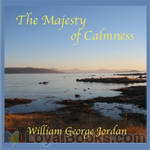 The Majesty of Calmness
The Majesty of Calmness
Change your life by changing your thoughts. The Majesty of Calmness is your guide to attracting prosperity, manifesting opportunities, and managing stress–all while discovering the values most precious to you. | |
By: American Bible Union | |
|---|---|
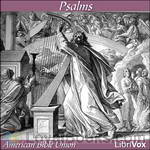 Psalms
Psalms
This 1871 revision of The Psalms by the American Bible Union is based on the “Common Version”, another name for the 1833 revision of the King James Version of The Bible by Noah Webster. | |
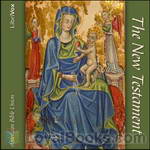 The New Testament
The New Testament
This Revised Testament has been prepared under the auspices of the American Bible Union, by the most competent scholars of the day. No expense has been spared to obtain the oldest translations of the Bible, copies of the ancient manuscripts, and other facilities to make the revision as perfect as possible. The paragraph form has been adopted in preference to the division by verse, which is a modern mode of division, never used in the ancient scriptures. But, for convenience of reference, the numbers of the verses are retained... | |
By: Margery Williams (1881-1944) | |
|---|---|
 The Velveteen Rabbit
The Velveteen Rabbit
“What is REAL?” asked the Rabbit one day… Written in 1922, The Velveteen Rabbit, or, How Toys Become Real is the tale of a sweet unassuming toy rabbit who questions what it is to live and to love. It was the first children’s title written by Margery Williams (1881 – 1944), who had previously created only for adults. This story eclipsed all others, to become her most famous work, and an ever adored classic for all ages. | |
By: John Ruskin (1819-1900) | |
|---|---|
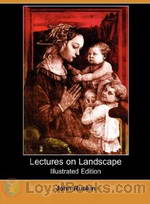 Lectures on Landscape
Lectures on Landscape
A series of lectures on landscape painting delivered at Oxford in 1871, by artist, critic, and social commentator, John Ruskin. | |
 Unto this Last: Four Essays on the First Principles of Political Economy
Unto this Last: Four Essays on the First Principles of Political Economy
John Ruskin (1819 – 1900) is best known for his work as an art critic and social critic, but is remembered as an author, poet and artist as well. Unto This Last is an important work of political economic though that influenced Gandhi, among others. (Hugh McGuire/Wikipedia) | |
 The King of the Golden River
The King of the Golden River
When three brothers mortally offend Mr. Southwest Wind, Esquire, their farm is laid waste and their riches lost. Desperate for money, the brothers become goldsmiths and melt down their remaining treasures . . . only to find that the spirit of the King of the Golden River resides with a molded tankard, and knows the secret of the riches of the Golden River. (Introduction by Xenutia) | |
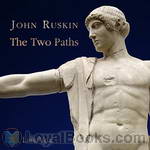 The Two Paths
The Two Paths
"The Two Paths" is a collection of five lectures delivered in 1858 and 1859 by John Ruskin on art and architecture. This is how the author himself presents the book: "The following addresses, though spoken at different times, are intentionally connected in subject; their aim being to set one or two main principles of art in simple light before the general student, and to indicate their practical bearing on modern design. The law which it has been my effort chiefly to illustrate is the dependence of all noble design, in any kind, on the sculpture or painting of Organic Form." The most famous of these, the fifth lecture, is commonly known simply as "The Work of Iron" | |
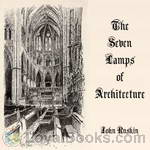 The Seven Lamps of Architecture
The Seven Lamps of Architecture
The Seven Lamps of Architecture, published in May 1849, is an extended essay written by the English art critic and theorist John Ruskin. The 'lamps' of the title are Ruskin's principles of architecture, which he later enlarged upon in the three-volume The Stones of Venice. To an extent, they codified some of the contemporary thinking behind the Gothic Revival. At the time of its publication A.W.N. Pugin and others had already advanced the ideas of the Revival and it was well under way in practice... | |
 The Elements of Drawing In Three Letters to Beginners
The Elements of Drawing In Three Letters to Beginners
| |
 The Stones of Venice, volume 1
The Stones of Venice, volume 1
The Stones of Venice is a three-volume treatise on Venetian art and architecture by English art historian John Ruskin, first published from 1851 to 1853. Intending to prove how the architecture in Venice exemplified the principles he discussed in his earlier work, The Seven Lamps of Architecture, Ruskin examined the city in detail, describing for example over eighty churches. He discusses architecture of Venice's Byzantine, Gothic and Renaissance periods, and provides a general history of the city as well... | |
 Lectures on Architecture and Painting Delivered at Edinburgh in November 1853
Lectures on Architecture and Painting Delivered at Edinburgh in November 1853
| |
 The Poetry of Architecture Or, the Architecture of the Nations of Europe Considered in its Association with Natural Scenery and National Character
The Poetry of Architecture Or, the Architecture of the Nations of Europe Considered in its Association with Natural Scenery and National Character
| |
 Selections From the Works of John Ruskin
Selections From the Works of John Ruskin
| |
 Unto This Last and Other Essays on Political Economy
Unto This Last and Other Essays on Political Economy
| |
 Stones of Venice [introductions]
Stones of Venice [introductions]
| |
 Modern Painters, Volume 1 (of 5)
Modern Painters, Volume 1 (of 5)
| |
 The Crown of Wild Olive also Munera Pulveris; Pre-Raphaelitism; Aratra Pentelici; The Ethics of the Dust; Fiction, Fair and Foul; The Elements of Drawing
The Crown of Wild Olive also Munera Pulveris; Pre-Raphaelitism; Aratra Pentelici; The Ethics of the Dust; Fiction, Fair and Foul; The Elements of Drawing
| |
 Lectures on Art Delivered before the University of Oxford in Hilary term, 1870
Lectures on Art Delivered before the University of Oxford in Hilary term, 1870
| |
 The Storm-Cloud of the Nineteenth Century Two Lectures delivered at the London Institution February 4th and 11th, 1884
The Storm-Cloud of the Nineteenth Century Two Lectures delivered at the London Institution February 4th and 11th, 1884
| |